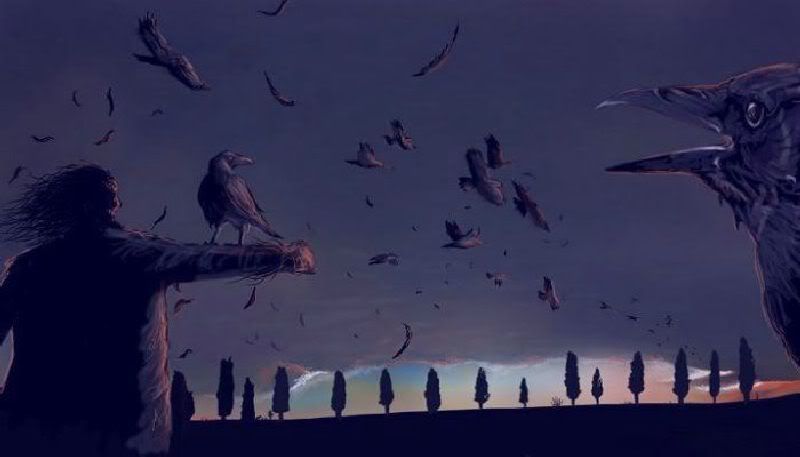(17) Some more folklore
Finding a dead crow on the road is good luck.
Crows in a church yard are bad luck
A single crow over a house meant bad news, and often foretold a death within. "A crow on the thatch, soon death lifts the latch."
It was unlucky in Wales to have a crow cross your path. However, if two crows crossed your path, the luck was reversed. "Two crows I see, good luck to me"
In New England, , to see two crows flying together from the left was bad luck.
When crows were quiet and subdued during their midsummer's molt, some European peasants believed that it was because they were preparing to go to the Devil to pay tribute with their black feathers.
Often, two crows would be released together during a wedding celebration. If the two flew away together, the couple could look forward to a long life together. If the pair separated, the couple might expect to be soon parted, too. (This practice was also performed using pairs of doves).
In Chinese mythology a three legged crow was used to represent the Sun (because 3 was the number for light and goodness, which the sun was the embodiment of)
Magpies are ominous birds, able to foretell events by the size of the group in which they fly ( "One for sorrow, two for...")
A spell of protection used when a magpie was seen was to cross yourself, raise your hat to the bird or spit three times over right shoulder and say 'devil, devil, I defy thee'. This was particularly useful if you did not like the future as foretold by counting the magpies.
Magpies are accused of not wearing full mourning at the Crucifixion. Because they wore white when they were supposed to be all black, they have been cursed by God.
In Scotland, Magpies are thought to be so evil that each has a drop of the Devil's blood under its tongue.
In Somerset (West Country of England) locals used to carry an onion with them for protection from magpies or crows.
In the same area, locals used to tip their hats to Ravens, in order not to offend them.
Ravens are associated with the devil in many parts of UK. In Yorkshire children were threatened with the Great Black Bird which would carry them off if they were bad.
It has been said that a baby will die if a raven's eggs are stolen.
Ravens are considered royal birds. Legend has it King Arthur turned into one.
Alexander the Great was guided across the desert by two ravens sent from heaven.
The Tower of London houses ravens, and has for over 900 years. It is said that if the ravens ever leave the Tower, England will fall. Or, to be more exact, if they leave the Tower, the Tower will fall - and since the tower is (theoretically at least) tied to the crown of England, the Crown will fall - and if the Crown falls, then the Country shall fall, too. To prevent all this from happening, the ravens' wings are clipped.
(I read somewhere that the resident ravens of the Tower have to be 'replenished' quite often lately, because they seem to be dying of some unknown desease; the substitutes are captured in Wales...)
If a raven perches on a house in Wales, it will bring prosperity to the family within.
In Scotland, a raven circling a house was said to predict the death of someone within.
Rooks feeding in village streets or close to nests in the morning means bad weather is to come - usually storms or rain. , rooks flying far from their nest means fair weather.
Rooks used to be told of a landowner's death. The new landowner would stand under a rookery and give the news, usually adding the promise that only he and his friends would be allowed to shoot the birds in future. If he neglected the ceremony, the birds would desert the rookery - an evil omen in itself. This forecast the loss of the land and downfall of the family through poverty.
The French had a saying that evil priests became crows, and bad nuns became magpies.
The Greeks said "Go to the Crows" the same way we would say "Go to Hell."
The Romans used the expression "To pierce a Crow's eye" in relation to something that was almost impossible to do.
An Irish expression, "You'll follow the Crows for it" meant that a person would miss something after it was gone.
The expression, "I have a bone to pick with you" used to be " I have a crow to pick with you".

![[Go to Site Index]](http://i6.photobucket.com/albums/y225/Abramelinn/Banner_Crow4.jpg)

<< Home